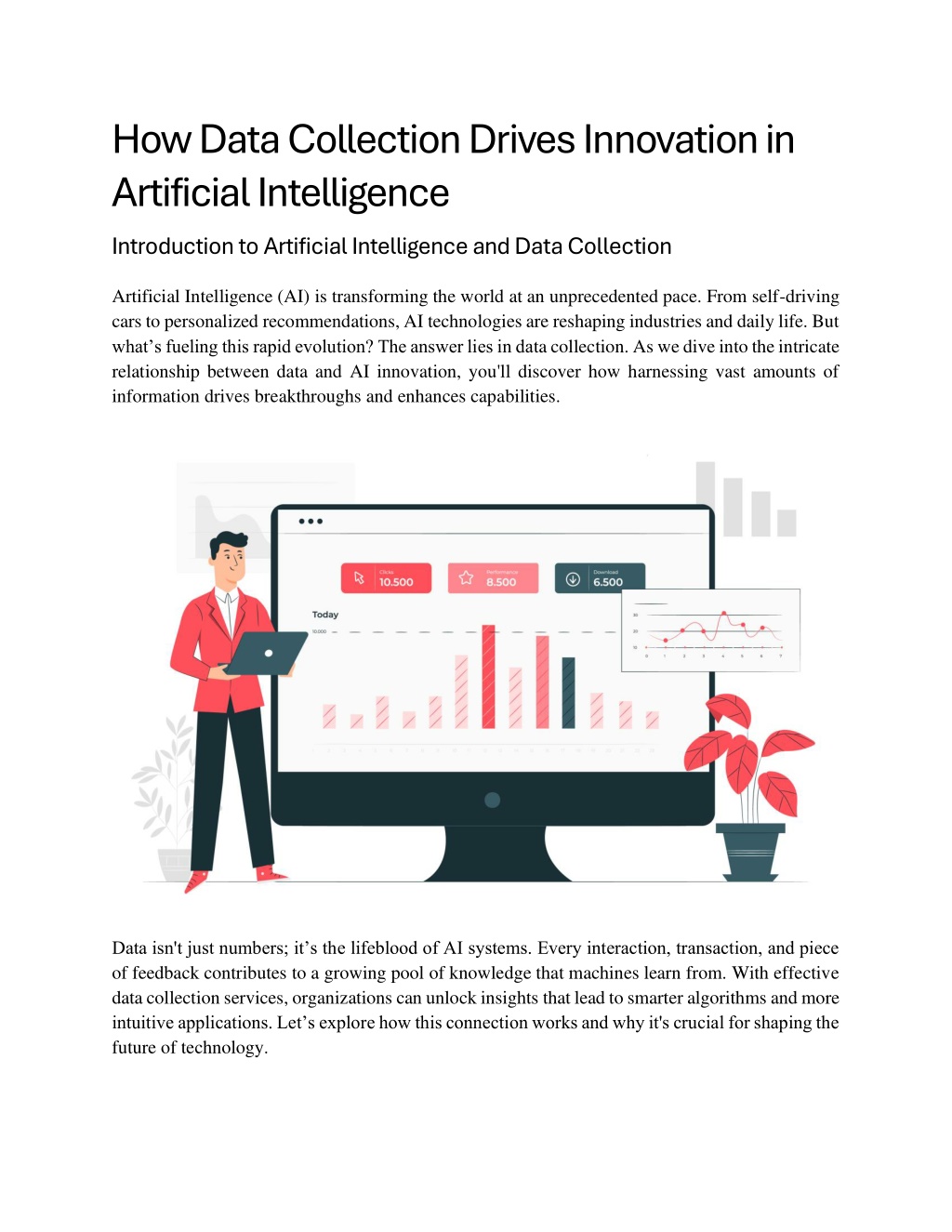
How Data Collection Drives Innovation in Artificial Intellig
As we dive deeper into the role of data sourcing company in fueling AI innovation, you'll discover why it matters now more than ever and how it paves the way for future advancements. Join us as we explore this dynamic intersection of technology and i
- data sourcing services
- data collection services
- data sourcing company
- data sourcing companies
- data collection company
- data collection companies
- image sourcing
- Video Sourcing
- document sourcing
Download Presentation

Please find below an Image/Link to download the presentation.
The content on the website is provided AS IS for your information and personal use only. It may not be sold, licensed, or shared on other websites without obtaining consent from the author. Download presentation by click this link. If you encounter any issues during the download, it is possible that the publisher has removed the file from their server.
E N D
Presentation Transcript
How Data Collection Drives Innovation in Artificial Intelligence Introduction to Artificial Intelligence and Data Collection Artificial Intelligence (AI) is transforming the world at an unprecedented pace. From self-driving cars to personalized recommendations, AI technologies are reshaping industries and daily life. But what s fueling this rapid evolution? The answer lies in data collection. As we dive into the intricate relationship between data and AI innovation, you'll discover how harnessing vast amounts of information drives breakthroughs and enhances capabilities. Data isn't just numbers; it s the lifeblood of AI systems. Every interaction, transaction, and piece of feedback contributes to a growing pool of knowledge that machines learn from. With effective data collection services, organizations can unlock insights that lead to smarter algorithms and more intuitive applications. Let s explore how this connection works and why it's crucial for shaping the future of technology.
The Importance of Data in AI Development Data is the lifeblood of artificial intelligence. Without it, AI systems lack context and understanding. Machine learning models thrive on vast amounts of data for training. The more diverse the dataset, the better these models can recognize patterns and make predictions. Accurate data enhances decision-making processes. In sectors like healthcare, finance, or retail, insights derived from data lead to innovations that directly impact outcomes. Moreover, high-quality data fosters trust in AI applications. Businesses increasingly rely on transparent algorithms that base their conclusions on solid evidence. As technology evolves, so does the need for comprehensive data collection services. Effective strategies not only streamline this process but also ensure compliance with ethical standards while maximizing value from collected information. Types of Data Used in AI Artificial intelligence thrives on various types of data, each serving a unique purpose. Structured data is the backbone of many AI applications. This format includes numerical values or categorical variables, often found in databases and spreadsheets. Unstructured data adds richness to AI models. Images, videos, text documents, and social media posts fall into this category. They provide context that can significantly enhance machine learning outcomes. Semi-structured data blends both worlds. It lacks strict organization but still contains tags or markers that help identify elements within it. XML files or JSON structures are prime examples. Real-time data plays a crucial role too. With rapid advancements in technology, AI systems increasingly rely on live feeds from sensors or online interactions to adapt and learn continuously. The diverse range of these datasets fuels innovation and drives progress across industries using artificial intelligence technologies.
How Data Collection Drives Innovation in AI Data collection serves as the lifeblood of artificial intelligence. It fuels algorithms and enables machines to learn from vast amounts of information. Without robust data, AI systems would struggle to identify patterns or make predictions. As AI evolves, so does the need for diverse datasets. The more varied the data collected, the better equipped these systems are to understand complex scenarios. This diversity opens doors for innovative applications across industries. For instance, in healthcare, extensive patient data empowers predictive analytics that can foresee disease outbreaks or optimize treatment plans. In retail, consumer behavior data allows businesses to offer personalized experiences that enhance customer satisfaction. Moreover, ongoing advancements in sensors and IoT devices provide real-time data streams essential for adaptive learning models. These innovations illustrate how effective data collection services drive continuous improvement and creativity within artificial intelligence landscapes. Examples of Innovative AI Technologies Artificial intelligence has transformed numerous industries through innovative technologies. One standout example is natural language processing (NLP), which powers virtual assistants like Siri and Alexa. These systems understand and respond to human speech, making interactions smoother. Another exciting advancement is computer vision. This technology enables machines to interpret visual information. Autonomous vehicles rely on it to navigate roads safely while identifying obstacles in real-time. AI-driven recommendation engines also showcase innovation. Platforms like Netflix and Amazon use algorithms that analyze user behavior, offering personalized content suggestions tailored to individual preferences. Healthcare sees remarkable applications too, with AI assisting in diagnostics. Machine learning models can analyze medical images faster than humans, helping doctors detect diseases early. These innovations illustrate the diverse capabilities of AI fueled by robust data collection service that enhance their effectiveness and precision across various sectors. Challenges and Ethical Concerns As the landscape of artificial intelligence continues to evolve, challenges and ethical concerns loom large. One significant issue is data privacy. With extensive data collection services, organizations often gather more information than users are comfortable sharing.
Bias in AI algorithms also presents a critical challenge. If the data collected isnt diverse or representative, it can lead to skewed results that perpetuate stereotypes or unfair treatment. There are also accountability questions surrounding decision-making processes driven by AI. When machines make choices affecting human lives, who is responsible for errors? Transparency becomes vital here. Users deserve clarity on how their data influences AI systems and decisions made about them. There s the potential for misuse of technology. Malicious actors could exploit advanced AI capabilities for harmful purposes if not properly regulated and monitored. Addressing these concerns requires a collaborative effort from developers, policymakers, and society as a whole. Future Outlook for AI and Data Collection The future of artificial intelligence is tightly interwoven with advancements in data collection company. As businesses and organizations ramp up their efforts to gather quality data, the potential for AI applications expands dramatically. We can expect more sophisticated algorithms that learn from diverse datasets. This will enhance decision-making processes across various sectors, from healthcare to finance. With improved data collection techniques, AI systems can analyze trends faster and with greater accuracy. Moreover, as technology evolves, so too does our ability to collect real-time data. Smart devices and IoT will continue to generate vast amounts of information, fueling innovative AI solutions tailored to specific needs. However, a robust framework around ethical guidelines for data usage is crucial moving forward. Balancing innovation with privacy considerations will shape the trajectory of both AI development and effective data management strategies in the coming years. Conclusion Data collection is at the heart of innovation in artificial intelligence. As AI continues to evolve, the need for high-quality data becomes increasingly critical. Businesses and researchers are constantly exploring new ways to gather information that can enhance machine learning algorithms and drive technological advancements. With diverse types of data fueling this growth from structured numerical datasets to unstructured text and images the potential applications seem limitless. The innovative technologies emerging from effective data collection services prove how vital this process is in shaping a smarter future.
However, its essential to navigate the challenges associated with data privacy and ethical considerations carefully. A responsible approach ensures that progress does not come at the cost of personal rights or societal norms. Looking ahead, AI's trajectory will depend significantly on how we adapt our strategies for data gathering. Companies that prioritize transparency and ethical practices will likely lead the charge in harnessing AI s full potential while maintaining public trust. The journey of artificial intelligence is just beginning, but its future looks promising as long as robust data collection remains integral to its development. Reach out to us understand how we can assist with this process - sales@objectways.com






















